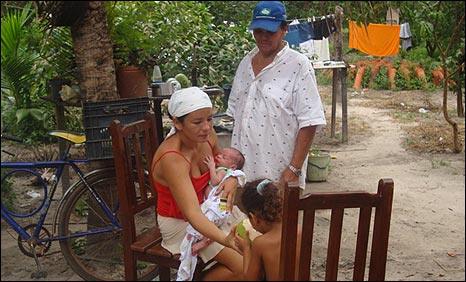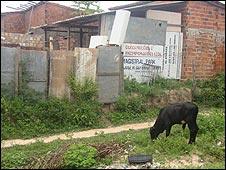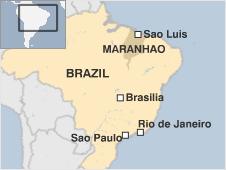Family friendly: Brazil's scheme to tackle poverty
- Published

Francineide Da Rocha: Cash handouts are small but make a big difference
In the countryside in Maranhao, one of the poorest states in Brazil, life moves slowly in the stifling morning heat.
At her home, not far from the capital Sao Luis, Francineide Da Rocha nurses her baby son Josue, born just 15 days ago, and she stops only to drink water from a freshly-cut coconut.
In this region, some 50% of the local population such as Francineide are on a form of family income support, known as Bolsa Familia, literally the Family Grant.
The cash transfer scheme puts money directly into the hands of some of Brazil's lowest income homes.
Across the country, some 12 million families receive the benefit. It is sometimes described as the largest programme of its kind in the world.
The money is generally given to mothers, who get up to $115 (£80) a month, depending on their income and how many children they have.
The aid is conditional. In return, children must attend school and receive the proper vaccinations.
Commercial success
"I think it is good and it helps a lot," says Francineide.
"When the money comes it is always better because there are many families in Brazil that depend on it, and even though it is a small amount, it makes a big difference."
The new baby is Francineide's second child, and the monthly assistance she receives from Bolsa Familia will now rise to $66.
It helps to supplement the meagre income she gets from selling vegetables.
Further up the road, her father Joao works on a small plot of land and also receives a helping hand from the state in the form of low interest loans.
Critics say the family grant his daughter receives offers financial help, but no clear route to escape from poverty.
Now Bolsa Familia is being tied in to existing projects which target small investors in both the countryside and the city.
Joao is using the money, which he gets from a scheme known as AgroAmigo administered by the state-run Bank of the North-East, to buy the materials he needs.
"It helps me to get water, to buy seeds," he says.
"In the past we used to collect them but you can't do that any more. And this money helps to make things better."
In nearby Sao Luis, the district of Liberdade is often in the headlines for its high rate of crime and other social problems.
The challenge here is also to give people the means to improve their lives, a chance that some are eager to seize.
Ruti Cunha's husband is disabled and she is now the lead provider for her family of three.
She already receives the Bolsa Familia grant to help her raise the children.
But after her husband was obliged to stop working, they opened a small clothes shop to make ends meet.
A financial adviser from the Bank of the North-East arranged a low interest loan under the scheme CrediAmigo, and the money helped to refurbish the store.
"My life is different because today I have the means to buy the goods I need," says Ruti.
"I sell by credit card, or offering credit deals - things that I used to dream of, and now I am able to do it. I started with a loan of $340 and now I have $2,800."
Bank officials say few people fail to make repayments on these low interest loans while many - especially women - have gone on to commercial success.
At the local market in Liberdade, the results of some of this investment can be seen.
Stall owners who, with a bit of a support, have managed to start out their own business, however small the venture.
'Small fiscal cost'
However the picture is not universally positive.
A short distance from Ruti's home, thousands of families live in what are called "palafitas", houses built on stilts to keep them above water level.

Brazil is finding new ways to confront old problems
The families have little access to even basic sanitation or water, and there is a strong smell from the waste that culminates below the fragile wooden houses.
Children play amid the dirt and heavily-armed police officers can be seen patrolling the unpaved lanes.
Nearly 300 families were recently moved out of the area to brightly-painted and newly-constructed flats, but the local residents' association claims this project has stalled, at least for the moment.
They also complain that in an area like this it is hard to get access to Bolsa Familia.
But analysts say, despite enormous challenges, Brazil is becoming a more equal society.
Bolsa Familia in particular is a cost effective way of helping the poor, says Marcelo Neri, chief economist for social policies at the Getulio Vargas Foundation.
"The main thing is that it is a very small fiscal cost," he says.
"That is the big advantage of Bolsa Familia. You spend 0.4% of GDP, and reach 25% of the population, which are the poorest.

"Since they are the poorest, a little money can really make a big change in these people's lives."
In this year, when Brazil will elect a new president, there seems to be a fairly broad consensus in support of such initiatives, with the only argument about who should get the credit for projects, some of which have been in existence for many years.
The government of President Lula insists the investment is much bigger now, and that in recent years 20 million Brazilians have been lifted out of poverty.
It remains all too easy to find evidence of the poor social conditions which disfigure large parts of Brazilian life, such as can be found in parts of Liberdade.
But a picture is also emerging of a country confronting old problems in new ways, helping to improve the lives of many of its citizens.